
Overview
The Alpine area is one of the regions in Europe most affected by rising temperatures. Cities surrounded by mountains face growing risks such as heatwaves, poor air quality, and public health challenges. Yet, public awareness of the actions needed remains low. By involving citizens directly, COMMONAIR aims to foster informed discussions, smarter policies, and stronger adaptation to climate challenges. Through collaboration across regions and countries, COMMONAIR also seeks to facilitate the exchange of best practices, with a view to enhancing climate resilience in the Alps.
Factsheet
- 2021 – 2027
- Cooperatively managed and developed Alpine region
- SO 4.1 - Enhancing institutional capacity of public authorities and stakeholders to implement macro-regional strategies and sea-basin strategies, as well as other territorial strategies
-
- AG8 Risk governance
- 01/2025
- 12/2026
- 634.575 EUR
- 404.531 EUR
Description
The Alpine region is the most affected in Europe by rising temperatures, and cities, especially those surrounded by mountains, are facing increased heat-related risks to public health in the built environment. In addition, air quality is a challenge in this region as pollution remains captured by the mountains' outline. The impacts of global warming are well known, but public awareness of the needed everyday individual and collective actions is still lacking. COMMONAIR promotes new governance models based on a bottom-up “citizen science” approach to monitor cities' microclimate at the local scale with and by citizens. COMMONAIR seeks to bridge the gap between science-based methods, involvement of the public and policy implementation by local governments. Temperature, public open spaces comfort and air quality measurements made by citizen target groups, including students, NGOs, with experts' support, are the starting point of informed local debate and appropriate policy making. This approach significantly innovates governance, both vertically and horizontally, involving all levels of decision-making, government, stakeholders and local actors. It also provides, through meetings and communication tools, a regional and transnational share of good practices and results among stakeholders who face similar challenges in the Alps, enhancing adaptation capacity.
The previous experience cooperative work among the four country teams, tested in Grenoble and Turin, will be shared and discussed. The EUSALP AG 8 “Risk Governance” will be involved to foster the transferability of the tools and processes developed in the project. The project will follow the European Commission's greening recommendations as well as the EUSALP priority for a carbon-neutral Alpine Region.
Partners
- 45.0542017500000047.686955115929997
- 45.07310537.6810397
- 48.1985396516.369861676286614
- 47.49992068.7204505
- 45.18623875.7350717















Outcomes
-
Pilot action
In the first year of the project (period 1 and part of period 2), based on the skills and experiences of the partners in the research field as well as in the participatory practice, citizen science experiments will be developed. Pilot actions by target groups will investigate local climate to increase community knowledge of climate change and the adaptation policies needed. Seven pilots are planned in the four countries. Such experiences will be shared and discussed among all the partners. -
Cooperation pacts - Community Climate Sentinel
Cooperation pacts or similar agreements will be developed as a joint solution to be applied in the project areas to strengthen participation in the adaptation planning and policies by the public institutions. Through the Community Climate Sentinel pacts, the on-site measurements and discussion activities will continue, both as an important source of scientific knowledge and as a way of community empowerment to tackle extreme heat risks. -
Involvement of Organisations at different levels increasing their institutional capacity
On a transnational level, EUSALP AG8 will be involved, participating in the 06/2025 and semiannual 2026 meetings. The Alpine Convention will be informed about the results of the project. The practices and results of Commonair will be shared by the partners in local and international initiatives, creating synergies. The project will join the labelling process that will be set up as part of the 100 climate neutral cities initiative. At the local level, many organisations will be actively involved.
Pilots
-
Scuole San Carlo & Bagni di Via Agliè measurement activities






- Description and aim of the Pilot
The activities of this Pilot are the sensitisation of the students and associates of the Scuole San Carlo and Bagni di Via Agliè (the first being a secondary school and the latter being a citizen association) about climate change and meteorology related themes; and then involving them in the measurement of air temperature during pre-scheduled summer days in Turin.
The primary aim of these experiments and activities is to obtain valuable data, which can be manipulated through simulation and mapping tools to get an idea of the hot spots of the area. This kind of activity also improves citizens' knowledge and perception of the area they live in, beyond including them in governance-related processes to improve the city's livability. - Key Activities:
- Frontal lessons with the citizens, in association with ARPA Piemonte, to sensitize them about some general topics such as climate change, meteorology, hot spots and urbanisation processes. In the same way, the Interreg COMMONAIR project is introduced to them, to let them know how they can play a part in the action and why it's important their collaboration.- Practical workshops such as path mapping and instruction-giving demonstration on the usage of the measurement tool (Meteotracker). The mapping activities are meant to appoint different groups of citizens who can manage together each measurement session.- Measurement sessions, carried out by groups of citizens. The sessions are organized to be carried out in crucial moments of the day for the people involved (i.e. going back home after work), to explore the most comforting and discomforting parts of each undertaken pre-scheduled path. The measurement tool that is used is called Meteotracker: it is a portable sensor that can be used by launching measurement sessions through a mobile application (for more information on Meteotracker see the link below).- Results reporting meetings. After the measurement sessions are complete and the data is organised and elaborated through the simulation software (ENVI-met, see link below), the results are shared and commented with citizens and other eventual interested parties (i.e. local population and local governance agencies). - Involved Project Partners and Observers
- Project Partners:
Politecnico di Torino
Comune di Torino- Project Observers:
ARPA Piemonte
Associazione Scuole Tecniche San Carlo
Bagni Pubblici di Via Agliè - Useful Links
Meteotracker (https://meteotracker.com/index.php/it/homepage-2/)
ENVI-met (https://envi-met.com/)
- Description and aim of the Pilot
Project calendar



